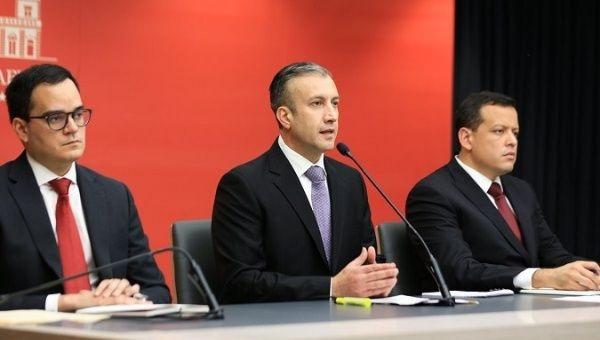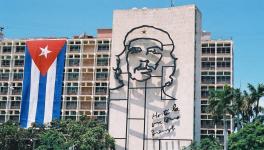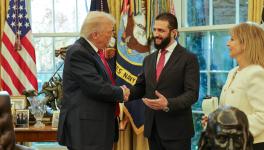Venezuela Switches From Dollar to Euro in Foreign Exchange to Tackle US blockade

Venezuelan minister Tarreck Al Aissami announcing decision to switch from dollar to euro in a press conference. (Photo: Twitter/@PresidencialVen)
On Tuesday, October 16, Venezuela announced the curtailment of the use of US dollar in their foreign exchanges and the decision to use euro instead. As a result, they have decided to pump in around 2 billion euros immediately to the Venezuelan economy. The country’s Minister for Industries and National Production, Tareck El Aissami, announced that this move has been made in order to tackle the sanctions imposed by US over Venezuela on using US dollar for international exchange. He made the announcement in a press conference at the Simon Bolivar press room in the presidential house, Miraflores Palace. Simon Zerpa, Minister of Popular Power for Economy and Finance, and Calixto Ortega, President of the Central Bank of Venezuela (BCV), were also present in the press meet.
“The American financial blockade of Venezuela affects both the country’s public and private sectors, including pharmacy and agriculture, and shows just how far imperialism can go in its madness. Venezuela’s floating exchange rate system, DICOM, will be operating in Euro, Yuan or any other convertible currency and will allow the foreign exchange market to use any other convertible currency,” El Aissami said. He also added that all private banks in Venezuela are obliged to participate in the DICOM bidding system.
The dropping of US dollar is considered to be a strong move to evade the “illegal” US sanctions imposed against the socialist country. US sanctions over Venezuela caused a steep decline in the country’s crude oil production. This has threatened a large number of social welfare policies which are implemented by Venezuela, responsible for bringing millions out of poverty.
Fall in imports and cash crunch are seen as the main triggers behind Venezuela’s current financial crisis, caused mainly due to US sanctions. According to experts, between 2012 and 2017, imports of goods and services fell by 80.9%. Oil production in the country fell by 19% in 2017, and by 25% in the first eight months of 2018.
On May 19, 2018, Venezuela established the new foreign currency system at the supplementary floating market exchange rate (DICOM), which operates in the form of auctions of foreign currency. This allows the sale and purchase of foreign currency in exchange for local currency, under the directions of the Central Bank of Venezuela (BCV).
‘Petro’ to combat financial blockade
This move comes after the country had introduced its new cryptocurrency to bypass the US imposed sanctions.
On October 1, Venezuela had formally announced the entry of its cryptocurrency, petro, into the global market. Petro will be the new national and international economic exchange unit and it will be backed by the vast oil resources of the country. Each unit of petro is equivalent to 3600 Sovereign Bolivars (Venezuela’s currency), and was introduced to raise foreign investments and bypass the US sanctions on the country.
Venezuelan President Nicolas Maduro tweeted after the official launch, “Petro came to strengthen the economic recovery programme and to revolutionize the global cryptoeconomy as a new form of commercial, financial and monetary exchange.” He added, “Petro is already available in six major international transaction houses and is now open to buy. From November 5, Venezuelans can buy Petro using Sovereign Bolivar and use it for transactions in real estate and buying air tickets.”
Maduro also inaugurated the headquarters of National Superintendency of Crypto Activities and Related Activities and activated the Comprehensive National Plan of Cryptoactivities of Venezuela overreaching 10 years on October 1. He has given a call for a meeting of experts in digital currencies on October 29 to discuss the developments related to the petro.
Earlier, as part of a new round of economic reforms in Venezuela, a new currency, the Sovereign Bolivar was launched with effect from August 20. The new currency was anchored with the petro (unofficially launched by Venezuela in February 2018). An eight-point reform proposal was also introduced then by Maduro. Many are hopeful that these new economic measures can effectively pull Venezuela out of the ongoing economic crisis and destabilize the hegemony of the dollar as well as the hold of the right wing over the economy.
Get the latest reports & analysis with people's perspective on Protests, movements & deep analytical videos, discussions of the current affairs in your Telegram app. Subscribe to NewsClick's Telegram channel & get Real-Time updates on stories, as they get published on our website.
























